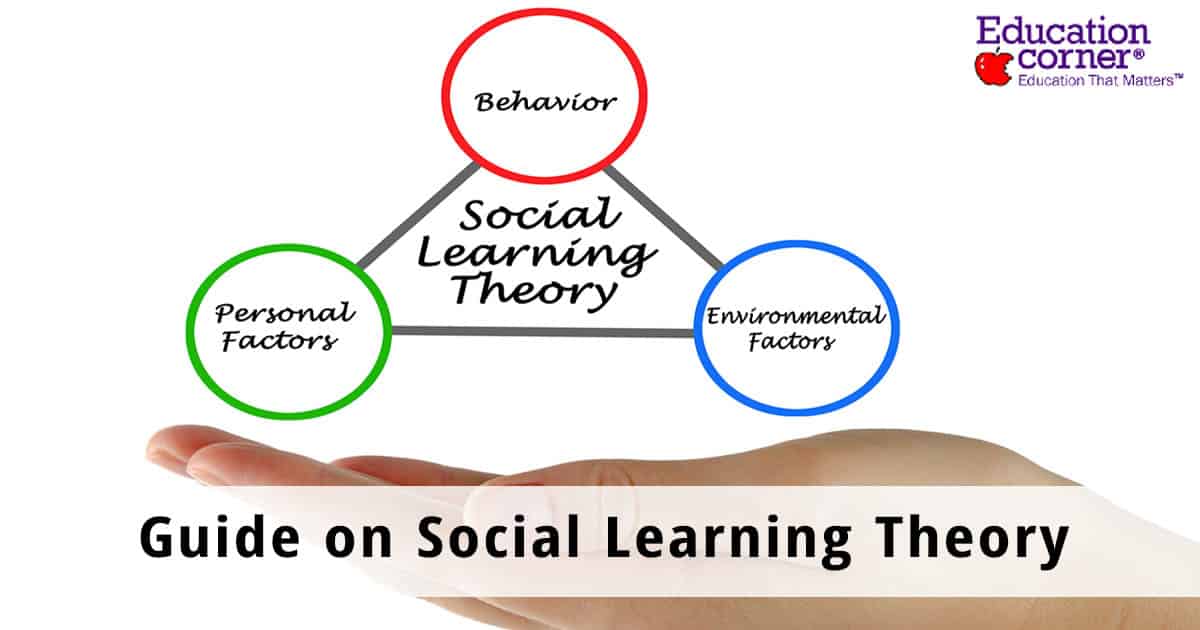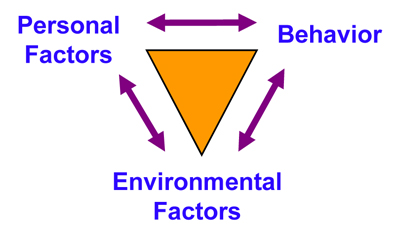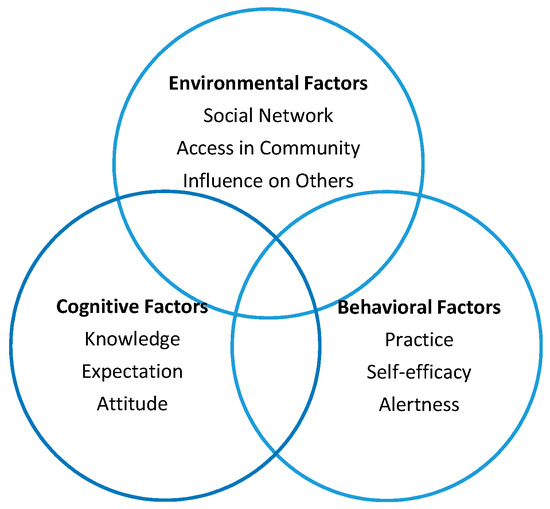Your What are the components of social cognitive theory images are ready in this website. What are the components of social cognitive theory are a topic that is being searched for and liked by netizens today. You can Find and Download the What are the components of social cognitive theory files here. Find and Download all free photos.
If you’re looking for what are the components of social cognitive theory pictures information related to the what are the components of social cognitive theory interest, you have visit the ideal site. Our site frequently gives you suggestions for refferencing the maximum quality video and image content, please kindly surf and locate more enlightening video articles and images that fit your interests.
What Are The Components Of Social Cognitive Theory. We reproduce previously learned information behavior skills knowledge when required. The models can be those of an interpersonal imitation or media sources. Performance on the two social-cognitive tests was highly correlated in the HFA group but these were not related with the social-perceptual component. The Social Cognitive Theory is composed of four processes of goal realization.
 Http Livasperiklis Files Wordpress Com 2012 09 Theory Of Mind Picture Jpg Gif Social Cognitive Theory Mindfulness Behavior Interventions From pinterest.com
Http Livasperiklis Files Wordpress Com 2012 09 Theory Of Mind Picture Jpg Gif Social Cognitive Theory Mindfulness Behavior Interventions From pinterest.com
The Social Cognitive Theory is composed of four processes of goal realization. The four components are interrelated and all have an effect on motivation and. The theory emerged largely from the work of Albert Bandura. Social cognitive career theory SCCT is a relatively new theory that is aimed at explaining three interrelated aspects of career development. 1 how basic academic and career interests develop 2 how educational and career choices are made and 3 how academic and career success is obtained. Self-observation self-evaluation self-reaction and self-efficacy Redmond 2010.
This theory is an excellent learning model given that it incorporates both the social aspects and cognitive aspects of the process.
Self-observation - Observing oneself can inform and motivate. Albert Bandura coined the social cognitive theory in the 1960s. Performance on the two social-cognitive tests was highly correlated in the HFA group but these were not related with the social-perceptual component. International Encyclopedia of the Social Behavioral Sciences Second Edition 2015. Social-cognitive theories of personality emphasize the role of cognitive processes such as thinking and judging in the development of personality. The social cognitive theory of self-regulation proposes that three main components of the theory self-monitoring self-judgement and self-evaluation contribute to self-regulation and influence successful behaviour change.

The HFA group had more difficulties in all tasks. The four components are interrelated and all have an effect on motivation and goal attainment Redmond 2010. Self-observation self-evaluation self-reaction and self-efficacy Redmond 2010. Self-observation self-evaluation self-reaction and self-efficacy Redmond 2010. Self-observation self-evaluation self-reaction and self-efficacy Redmond 2010.
 Source: pinterest.com
Source: pinterest.com
We cannot learn if we are not focused on the task. Self-observation self-evaluation self-reaction and self-efficacy Redmond 2010. SCT identifies three main factors that influence behavior and behavioral choices. Behavioral Capability - This refers to a persons actual ability to perform a behavior through essential knowledge and. Measurements Self-efficacy is a key element of Social Cognitive Theory because it affects students motivation and learning Pajares 1996 2006.
 Source: educationcorner.com
Source: educationcorner.com
Social cognitive theory revolves around the process of knowledge acquisition or learning directly correlated to the observation of models. In essence it has both the informal and formal elements of learning that complement each other for an incredible learning process. Social-cognitive theories of personality emphasize the role of cognitive processes such as thinking and judging in the development of personality. Social cognitive theory the cognitive formulation of social learning theory that has been best articulated by Bandura 24 25 explains human behavior in terms of a three-way dynamic reciprocal model in which personal factors environmental influences and behavior continually interact. The Social Cognitive Theory is composed of four processes of goal realization.
 Source: sciencedirect.com
Source: sciencedirect.com
The theory incorporates a variety of concepts eg interests abilities values. Social cognitive theory the cognitive formulation of social learning theory that has been best articulated by Bandura 24 25 explains human behavior in terms of a three-way dynamic reciprocal model in which personal factors environmental influences and behavior continually interact. We reproduce previously learned information behavior skills knowledge when required. Self-observation self-evaluation self-reaction and self-efficacy Redmond 2010. Social-cognitive theories of personality emphasize the role of cognitive processes such as thinking and judging in the development of personality.
 Source: in.pinterest.com
Source: in.pinterest.com
Social cognitive theory SCT used in psychology education and communication holds that portions of an individuals knowledge acquisition can be directly related to observing others within the context of social interactions experiences and outside media influences. One of the major components of social cognitive theory is observational learning. The Social Cognitive Theory is composed of four processes of goal realization. The theory emerged largely from the work of Albert Bandura. Observational Learning - This.
 Source: pinterest.com
Source: pinterest.com
The theory emerged largely from the work of Albert Bandura. Measurements Self-efficacy is a key element of Social Cognitive Theory because it affects students motivation and learning Pajares 1996 2006. The Social Cognitive Theory Reciprocal Determinism - This is the central concept of SCT. Social cognitive theory SCT used in psychology education and communication holds that portions of an individuals knowledge acquisition can be directly related to observing others within the context of social interactions experiences and outside media influences. 1 how basic academic and career interests develop 2 how educational and career choices are made and 3 how academic and career success is obtained.
 Source: in.pinterest.com
Source: in.pinterest.com
The distinction between the social-cognitive and social-perceptual components of Theory of Mind was also explored. Performance on the two social-cognitive tests was highly correlated in the HFA group but these were not related with the social-perceptual component. Self-observation self-evaluation self-reaction and self-efficacy Redmond 2010. Social Cognitive Theory emphasizes simultaneous and reciprocal effects of the environment and behavior proposing that our behavior is affected by two things. Self-observation self-evaluation self-reaction and self-efficacy Redmond 2010.
 Source: pinterest.com
Source: pinterest.com
1 the environment eg neighborhood proximity to gym 2 individual personality characteristics andor experience including cognitions and 3 behavioral factors. Self-observation self-evaluation self-reaction and self-efficacy Redmond 2010. According to Bandura SCT is founded on reciprocal triadic relations among personal behavioral and environmental factors. The four components are interrelated and all have an effect on motivation and goal attainment Redmond 2010. What are the four components of social cognitive theory.
 Source: pinterest.com
Source: pinterest.com
The four components are interrelated and all have an effect on motivation and goal attainment Redmond 2010. The theory incorporates a variety of concepts eg interests abilities values. According to Bandura SCT is founded on reciprocal triadic relations among personal behavioral and environmental factors. Self-observation self-evaluation self-reaction and self-efficacy Redmond 2010. This theory is an excellent learning model given that it incorporates both the social aspects and cognitive aspects of the process.
 Source: pinterest.com
Source: pinterest.com
Social cognitive theory revolves around the process of knowledge acquisition or learning directly correlated to the observation of models. This refers to the dynamic and reciprocal interaction of. Self-observation self-evaluation self-reaction and self-efficacy Redmond 2010. Social cognitive theory synthesizes concepts and processes from cognitive. Performance on the two social-cognitive tests was highly correlated in the HFA group but these were not related with the social-perceptual component.

What are the four components of social cognitive theory. We cannot learn if we are not focused on the task. Social cognitive career theory SCCT is a relatively new theory that is aimed at explaining three interrelated aspects of career development. The models can be those of an interpersonal imitation or media sources. The HFA group had more difficulties in all tasks.
 Source: pinterest.com
Source: pinterest.com
According to Bandura SCT is founded on reciprocal triadic relations among personal behavioral and environmental factors. This theory is an excellent learning model given that it incorporates both the social aspects and cognitive aspects of the process. The four components are interrelated and all have an effect on motivation and goal attainment Redmond 2010. What are the components of Banduras social cognitive theory. Self-observation self-evaluation self-reaction and self-efficacy Redmond 2010.
 Source: pinterest.com
Source: pinterest.com
Performance on the two social-cognitive tests was highly correlated in the HFA group but these were not related with the social-perceptual component. The Social Cognitive Theory is composed of four processes of goal realization. Below we present a few examples of self-efficacy. Self-observation self-evaluation self-reaction and self-efficacy Redmond 2010. We learn by internalizing information in our memories.
 Source: med.upenn.edu
Source: med.upenn.edu
1 the environment eg neighborhood proximity to gym 2 individual personality characteristics andor experience including cognitions and 3 behavioral factors. SCT identifies three main factors that influence behavior and behavioral choices. What are the four components of social cognitive theory. The four components are interrelated and all have an effect on motivation and goal attainment Redmond 2010. The four components are interrelated and all have an effect on motivation and goal attainment Redmond 2010.
 Source: sciencedirect.com
Source: sciencedirect.com
This theory was advanced by Albert Bandura as an extension of his social learning theory. The theory incorporates a variety of concepts eg interests abilities values. Performance on the two social-cognitive tests was highly correlated in the HFA group but these were not related with the social-perceptual component. Social-cognitive theory describes how individuals think and react in social situations. Self-observation self-evaluation self-reaction and self-efficacy Redmond 2010.
 Source: pinterest.com
Source: pinterest.com
The Social Cognitive Theory is composed of four processes of goal realization. Albert Bandura coined the social cognitive theory in the 1960s. Self-observation self-evaluation self-reaction and self-efficacy Redmond 2010. The major theoretical components of SCT include modeling outcome expectations self-efficacy goal setting and self-regulation. We learn by internalizing information in our memories.
 Source: courses.lumenlearning.com
Source: courses.lumenlearning.com
The four components are interrelated and all have an effect on motivation and goal attainment Redmond 2010. This theory is an excellent learning model given that it incorporates both the social aspects and cognitive aspects of the process. It is the process of learning others desirable. The HFA group had more difficulties in all tasks. Measurements Self-efficacy is a key element of Social Cognitive Theory because it affects students motivation and learning Pajares 1996 2006.
 Source: mdpi.com
Source: mdpi.com
Social cognitive theory revolves around the process of knowledge acquisition or learning directly correlated to the observation of models. The Social Cognitive Theory is composed of four processes of goal realization. Social cognition is basically social thought or how the mind processes social information. Self-observation self-evaluation self-reaction and self-efficacy Redmond 2010. Social cognitive theory synthesizes concepts and processes from cognitive.
This site is an open community for users to share their favorite wallpapers on the internet, all images or pictures in this website are for personal wallpaper use only, it is stricly prohibited to use this wallpaper for commercial purposes, if you are the author and find this image is shared without your permission, please kindly raise a DMCA report to Us.
If you find this site helpful, please support us by sharing this posts to your preference social media accounts like Facebook, Instagram and so on or you can also save this blog page with the title what are the components of social cognitive theory by using Ctrl + D for devices a laptop with a Windows operating system or Command + D for laptops with an Apple operating system. If you use a smartphone, you can also use the drawer menu of the browser you are using. Whether it’s a Windows, Mac, iOS or Android operating system, you will still be able to bookmark this website.






